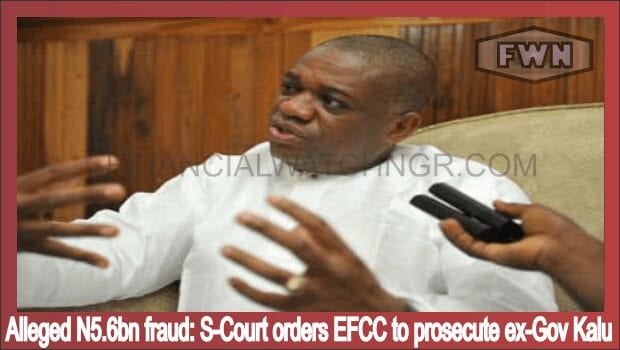The Supreme Court, on Friday, gave the Economic and Financial Crimes Commission, EFCC, the nod to prosecute the former Governor of Abia State, Dr. Orji Uzor Kalu on a 107-count corruption charges. The charges border on the alleged complicity of the erstwhile governor in money laundering and illegal diversion of public funds to the tune of N5.6billion. Kalu was alleged to have perpetuated the fraud while he piloted the affairs of Abia State between 1999 and 2007.
Orji Kalu Though the anti-graft agency docked him before the Abuja Division of the Federal High Court on July 27, 2007, however, for the past eight years, the defendant, through various interlocutory applications, frustrated moves by the prosecution to open its case against him. The defendant firstly challenged the competence of the charge against him, as well as the jurisdiction of the High Court to hear and determine the case.
Meanwhile, following refusal by the trial court to quash the charge, Kalu, took the case before the Court of Appeal in Abuja. The appellate court, in a unanimous judgment, upheld the competence of the charge, adding that the high court was constitutionally empowered to exercise jurisdiction on the trial. Dissatisfied with the verdict, Kalu approached the Supreme Court, begging it to set-aside the concurrent findings of the two lower courts.
The former governor, through his lawyer Chief Awa Kalu, SAN, pleaded a five-man panel of Justices of the apex court, headed by the Chief Justice of Nigeria, CJN, Justice Mahmud Mohammed, to quash the criminal charge against him. He contended that the EFCC failed to establish a prima-facie nexus linking him to the ingredients of the offence contained in the charge. It was his contention that the proof of evidence the anti-graft agency adduced against him did not nail him to the commission of any crime.
Reacting to the judgment, the former Governor of Abia State said that the decision of the Supreme Court directing his trial by the EFCC for alleged N2.4b fraud as governor was a welcome development, pointing out that there was nothing unusual about the order.
Dr. Kalu expressed his readiness to face his trial and prove his innocence on the 107-count corruption charges brought against him by the Commission. Dr. Kalu, who made this known from London where he was delivering a convocation lecture, declared that he was ready and highly disposed to the trial. “This is another opportunity to prove my innocence. I have all the records and facts of the case.
I am willing to submit myself for the rule of law to take its course. That has always been my passionate advocacy right from the lower courts where the case emanated. According to a release signed by his media adviser, Mr. Ebere Wabara, “this clarification has become imperative lest oppositional forces mischievously misinterpret the ruling and mislead the public by injecting their jaundiced opinions into the routine directive as had always been with similar cases where the apex court intervened. There is nothing novel about the latest manifestation in the on-going litigation — it was the next thing to expect.”
Nevertheless, the apex court, in a unanimous judgment on Friday, dismissed the appeal, even as it ordered the appellant to go and face his trial before the high court.
While upholding the Court of Appeal verdict, Justice Suleiman Galadima who delivered the lead verdict, said the apex court was satisfied that the former governor has a case to answer pertaining to allegations that were levelled against him by the EFCC. Besides, the apex court ordered the Chief Judge of the Federal High Court, Justice Ibrahim Auta, to re-assign the case to another Judge to enable the trial to commence de-novo (afresh).
The apex court also ordered accelerated hearing of the matter.
Trial Justice Binta Murtala Nyako had on July 27, 2007, granted Kalu bail in the sum of N100 million with two sureties in like sum. The court directed that the two sureties must be tax payers with evidence of regular payment for three consecutive years. The court equally seized the travelling documents of the defendant, warning that he must always apply for leave to travel out of the country.































